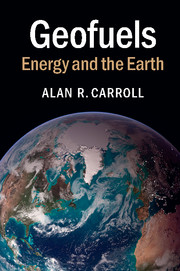Book contents
- Frontmatter
- Contents
- Acknowledgments
- 1 Introduction
- 2 The Living Earth
- 3 Warmed from Above: Solar Energy
- 4 Wind, Water, and Waves: Energy from the Fluid Earth
- 5 Covered in Green: Biofuels Basics
- 6 Fossil Farming: The Geologic Underpinnings of Biofuels
- 7 The Light of an Ancient Sun: Fossil Fuel Origins
- 8 Digging for Daylight: Coal and Oil Shale
- 9 Skimming the Cream: Conventional Oil and Gas
- 10 Stuck in the Mud: Fossil Fuels That Fail to Flow
- 11 Petrified Petroleum: Oil Sand and Gas Hydrate
- 12 Water, Water, Everywhere
- 13 Primordial Power: Geothermal and Nuclear
- 14 Out of Sight, Out of Mind: Geologic Waste Disposal
- 15 How Long Is Forever? Energy and Time
- 16 Conclusions
- Index
- References
1 - Introduction
Published online by Cambridge University Press: 05 March 2015
- Frontmatter
- Contents
- Acknowledgments
- 1 Introduction
- 2 The Living Earth
- 3 Warmed from Above: Solar Energy
- 4 Wind, Water, and Waves: Energy from the Fluid Earth
- 5 Covered in Green: Biofuels Basics
- 6 Fossil Farming: The Geologic Underpinnings of Biofuels
- 7 The Light of an Ancient Sun: Fossil Fuel Origins
- 8 Digging for Daylight: Coal and Oil Shale
- 9 Skimming the Cream: Conventional Oil and Gas
- 10 Stuck in the Mud: Fossil Fuels That Fail to Flow
- 11 Petrified Petroleum: Oil Sand and Gas Hydrate
- 12 Water, Water, Everywhere
- 13 Primordial Power: Geothermal and Nuclear
- 14 Out of Sight, Out of Mind: Geologic Waste Disposal
- 15 How Long Is Forever? Energy and Time
- 16 Conclusions
- Index
- References
Summary
Save the Planet! This slogan has been often repeated, and with good reason. The world we live on seems to be under heavy assault on numerous fronts, ranging from biological extinctions to potential shortages of key natural resources. Energy use and its consequences currently rank among the most pressing of these concerns, and not surprisingly are among the most hotly debated and divisive issues of the day. Our use of fossil fuels lies at the heart of the debate, largely because fossil fuels supply the vast majority of our current energy use (∼86 percent in the United States). It has also become increasingly clear that emissions from the burning of fossil fuels are altering the composition of the atmosphere, carrying the potential for catastrophic climate change.
So how did we get to this point? We live in a world made possible by the use of fossil fuels, but it was not always so. Prior to the 19th century virtually all energy was “green” energy, mostly derived from standing biomass in the form of agricultural crops and native vegetation. This biomass could be burned directly for warmth or fed to animals and humans to produce mechanical power (the horse still represents the reference point for some power measurements today!). Most people worked in the fields, went to sleep when it got dark, and rarely traveled far from their homes. This lifestyle may have been dull, but the boredom generally did not last very long. Average life expectancy at birth was far lower than today, estimated at forty years or less. Famine and pestilence were ever-present threats, and few means were available to combat them.
Dramatic change began with the Industrial Revolution, during the late eighteenth to early nineteenth centuries. The initial rise of machines was powered largely by coal, which fueled steam engines. The origins of the Industrial Revolution are undoubtedly complex, but it clearly occurred most rapidly in countries possessing rich supplies of coal (most notably Britain, Germany, and the United States).
- Type
- Chapter
- Information
- GeofuelsEnergy and the Earth, pp. 1 - 12Publisher: Cambridge University PressPrint publication year: 2015



